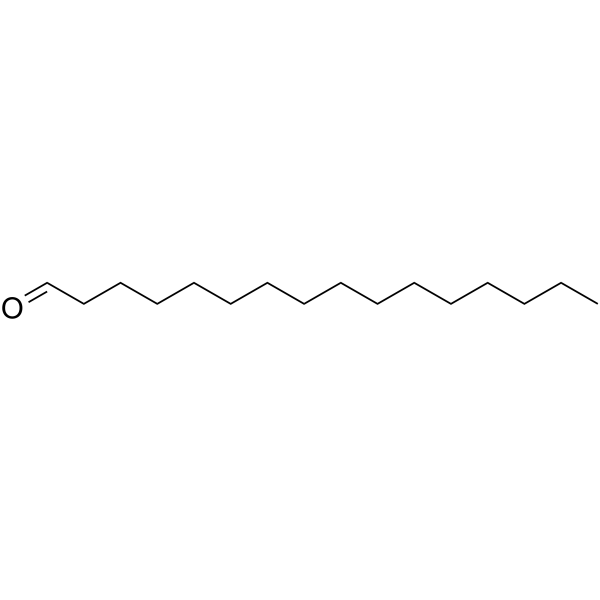
Hexadecanal
CAS No. 629-80-1
Hexadecanal( Palmitaldehyde )
Catalog No. M26567 CAS No. 629-80-1
Hexadecanal is a free fatty aldehyde present in animals.
Purity : >98% (HPLC)
 COA
COA
 Datasheet
Datasheet
 HNMR
HNMR
 HPLC
HPLC
 MSDS
MSDS
 Handing Instructions
Handing Instructions
| Size | Price / USD | Stock | Quantity |
| 100MG | 45 | Get Quote |


|
| 200MG | Get Quote | Get Quote |


|
| 500MG | Get Quote | Get Quote |


|
| 1G | Get Quote | Get Quote |


|
Biological Information
-
Product NameHexadecanal
-
NoteResearch use only, not for human use.
-
Brief DescriptionHexadecanal is a free fatty aldehyde present in animals.
-
DescriptionHexadecanal is a free fatty aldehyde present in animals.
-
In Vitro——
-
In Vivo——
-
SynonymsPalmitaldehyde
-
PathwayProteasome/Ubiquitin
-
TargetEndogenous Metabolite
-
RecptorEthoxyresorufin-O-deethylase (EROD)
-
Research Area——
-
Indication——
Chemical Information
-
CAS Number629-80-1
-
Formula Weight240.431
-
Molecular FormulaC16H32O
-
Purity>98% (HPLC)
-
SolubilityIn Vitro:?DMSO : 5 mg/mL (20.80 mM)
-
SMILESCCCCCCCCCCCCCCCC=O
-
Chemical Name——
Shipping & Storage Information
-
Storage(-20℃)
-
ShippingWith Ice Pack
-
Stability≥ 2 years
Reference
1.Pann Suh, et al. Compound having activity for inhibiting dioxin toxicity, pharmaceutical composition comprising the compound and method for treating disease resulting from dioxin toxicity using the compound .US 20070032458 A1.
molnova catalog



related products
-
Guanosine 5'-diphosp...
Guanosine 5'-diphosphate disodium salt is a nucleoside diphosphate is a potential iron mobilizer which prevents the hepcidin-ferroportin interaction and modulating the interleukin-6 (IL-6)/stat-3 pathway.
-
Hexacosanoic acid
Hexacosanoic acid a very long-chain fatty acid is related to adrenoleukodystrophy (ALD) adrenomyeloneuropathy (AMN) and atherosclerosis.
-
Leukotriene E4
Leukotriene E4 (LTE4) (LTE4) is produced by the action of dipeptidyl peptidase on LTD4 and is a component of the Slow Reactive Substance of Anaphylaxis (SRS-A).



 Cart
Cart
 sales@molnova.com
sales@molnova.com


